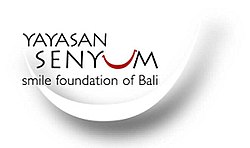Smile Foundation of Bali
 | |
| Founded | 2005[1] |
|---|---|
| Founder | Mary Northmore-Aziz |
| Type | Humanitarian Foundation |
| Location | |
Area served | Bali and the surrounding islands |
Key people | Mary Northmore-Aziz, David David, A. A. Asmarajaya |
| Website | SenyumBali.org |
The Smile Foundation of Bali (Yayasan Senyum) is a non-profit organisation in Bali that helps people with craniofacial disabilities obtain health care.[1] Senyum means smile in Indonesian and yayasan means 'foundation' or 'institute'.
The Smile Foundation facilitates operations for cleft lip and palate and other craniofacial deformities,[1] due to birth defects, accidents, or tumours. The organisation helps poor people from Bali, Lombok and further east, and raises funds for operations whether in Bali or Adelaide, Australia at the Australian Craniofacial Unit. Yayasan Senyum received a grant of US$2,500 from The Smile Train.[2]
History
[edit]
The Smile Foundation of Bali was founded in 2005 by Mary Northmore-Aziz at the suggestion of David David from the Australian Craniofacial Unit,[3] to identify those in need of craniofacial surgery. David David has continued his association as the chief adviser to the foundation. In December 2006 the foundation opened the "Smile Shop", which was the first Op shop in Bali.[4]
After extensive fundraising, the "Smile House" was opened in January, 2007, in Denpasar. The Smile House provides accommodation and educational facilities, in particular for those from outlying areas.[3]
Activities
[edit]The foundation provides pre- and post-operative support and helps to organise treatment for people suffering from craniofacial disabilities.[3] Part of this involves identifying those in need, both in Bali and the surrounding Indonesian islands, as per David David's initial request.[3] Once identified, the patients are sent either to the Sanglah General Hospital or the Dharma Husada Hospital in Denpasar, or, in the more serious cases, to the Australian Craniofacial Unit at the Women's and Children's Hospital in Adelaide, South Australia.[3] This may involve organising visas, passports and flights for the patients. For patients being treated in Denpasar, the Smile House provides accommodation, as well as educational services to the parents — in particular as regards post-operative care.[5]
Funding and operation
[edit]Much of the funding comes from donations from both individuals and organisations. For example, the Australian Consulate General in Bali, working with the Smile Foundation, provided funding for seventy children to have craniofacial surgery in 2006.[6]
Additional funds are raised the Smile Shop, which sells secondhand goods, largely from expatriates, but also increasingly old stock from local shops and linen from hotels.[4] The Smile Shop is staffed entirely by volunteers.[4]
See also
[edit]References
[edit]- ^ a b c "About Us". Yayasan Senyum Bali - Smile Foundation of Bali. Archived from the original on 2008-04-13. Retrieved 2008-03-30.
- ^ "Annual Report 2007". Yayasan Senyum Bali - Smile Foundation of Bali. www.senyumbali.org. Archived from the original on 2008-04-16. Retrieved 2008-03-31.
- ^ a b c d e Sertori, Trisha (October 3, 2007). "Foundation bringing back the smiles of children". The Jakarta Post.
- ^ a b c Dunkel, Margaret (September 3, 2007). "Bali 'op-shop' generates aid for reconstructive surgery". The Brunei Times.
- ^ "The Smile House". Yayasan Senyum Bali - Smile Foundation of Bali. Archived from the original on 2008-04-16. Retrieved 2008-03-30.
- ^ "Australia sponsoring surgeries for kids". The Jakarta Post. November 29, 2006.
External links
[edit]- Yayasan Senyum official website
- Smile Foundation ranked in Top ten NGO in 2013 by MaStyle Care : http://www.slideshare.net/mastylecare/top-ten-ngo-in-india-mastyle-care
